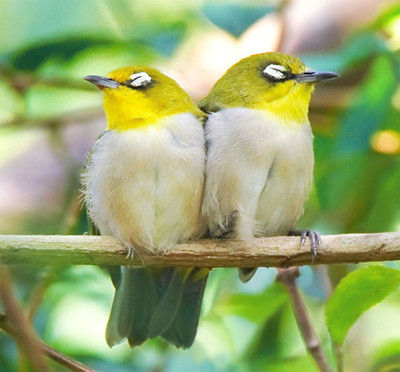We usually think of evolution as something that happens over eons, in remote places where people rarely venture. Not something that happens around the backyard birdfeeder in just a few decades. But a study in the journal Current Biology suggests that feeding birds in winter can influence their course of evolution.
在我們的通常印象中,物種進化需要經(jīng)歷長久的時間,且發(fā)生在人跡罕至的地方�����,似乎跟在自家后院喂了幾十年野鳥八這種事竿子打不著���。不過《當(dāng)代生物學(xué)》雜志上的一項研究卻表明���,在冬季向鳥類投食可能會影響到它們的進化進程�。
 The birds in this study were Central European blackcaps, a common kind of warbler. In spring, they breed in southern Germany. And when winter comes, they all fly south to the Mediterranean. At least they used to. In the 1960s, folks in Britain started putting out seed in winter. And the blackcaps split into two distinct groups. One goes to Spain to nosh on fruits and olives, the other heads north to take advantage of the easy English pickin’s.
The birds in this study were Central European blackcaps, a common kind of warbler. In spring, they breed in southern Germany. And when winter comes, they all fly south to the Mediterranean. At least they used to. In the 1960s, folks in Britain started putting out seed in winter. And the blackcaps split into two distinct groups. One goes to Spain to nosh on fruits and olives, the other heads north to take advantage of the easy English pickin’s.
進入生物學(xué)家們視野的這種鳥名叫黑頭鶯,歐洲常見的一種鳴鳥。春季的時候,它們在德國南部生育繁殖��;到了冬天���,它們就向南飛到地中海地區(qū)越冬��。至少��,這些黑頭鶯以前是這樣遷徙的。而從上世紀(jì)60年代開始,英國的民眾們開始在冬季的時候向戶外投食�����。這些黑頭鶯就此開始分裂成兩個族群����,到了冬季,一群飛往西班牙啃水果和橄欖,而另一群則飛到北邊的英國不勞而獲����。
The two populations may even be splitting into two species. The blackcaps that winter in England tend to mate with each other when they return to Germany. So they’re starting to look different from the birds that go south. Their beaks are longer and narrower, less suited to supping on Spanish olives. As birds of a feather, they definitely flock together. And to some degree, they have a bunch of bird-feeding Brits to thank.
而這兩個族群更有可能從此進化成兩種不同的物種���,那些冬季呆在英國的黑頭鶯在飛回德國繁衍后代時���,更趨向于和“同道中鳥”喜結(jié)連理����。這樣�����,它們漸漸和那些到了冬季往南飛的黑頭鶯們在外表上出現(xiàn)差異�����,它們的鳥喙顯得更狹長,這種形狀的鳥喙在啄食西班牙的橄欖時可是大大不便。而它們的羽毛����,較之自己的親戚們也顯得更加稠密�。說起來,這還多虧了英國人民的幫忙。
來源:可可英語 http://www.ccdyzl.cn/hangye/201112/165259.shtml The birds in this study were Central European blackcaps, a common kind of warbler. In spring, they breed in southern Germany. And when winter comes, they all fly south to the Mediterranean. At least they used to. In the 1960s, folks in Britain started putting out seed in winter. And the blackcaps split into two distinct groups. One goes to Spain to nosh on fruits and olives, the other heads north to take advantage of the easy English pickin’s.
The birds in this study were Central European blackcaps, a common kind of warbler. In spring, they breed in southern Germany. And when winter comes, they all fly south to the Mediterranean. At least they used to. In the 1960s, folks in Britain started putting out seed in winter. And the blackcaps split into two distinct groups. One goes to Spain to nosh on fruits and olives, the other heads north to take advantage of the easy English pickin’s.










